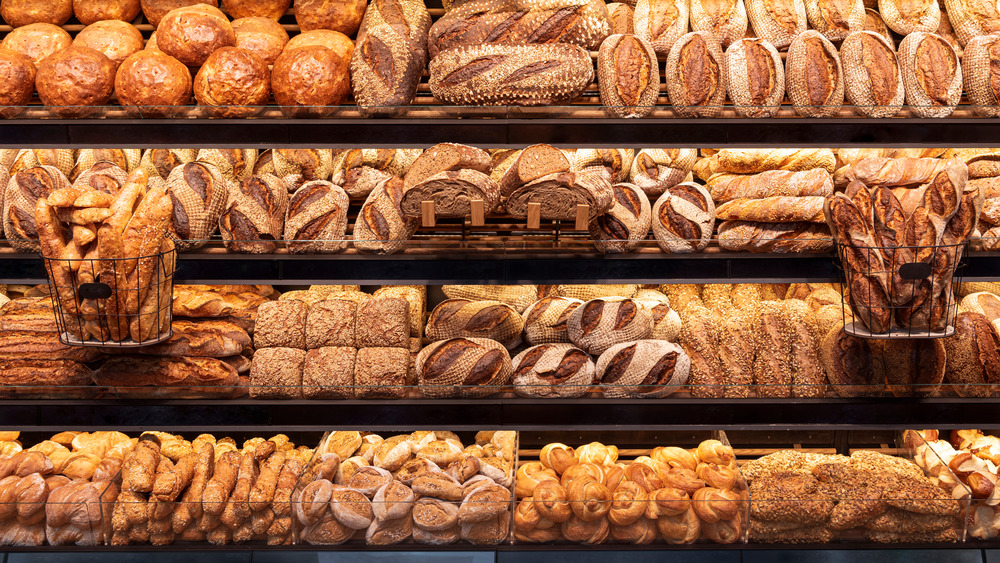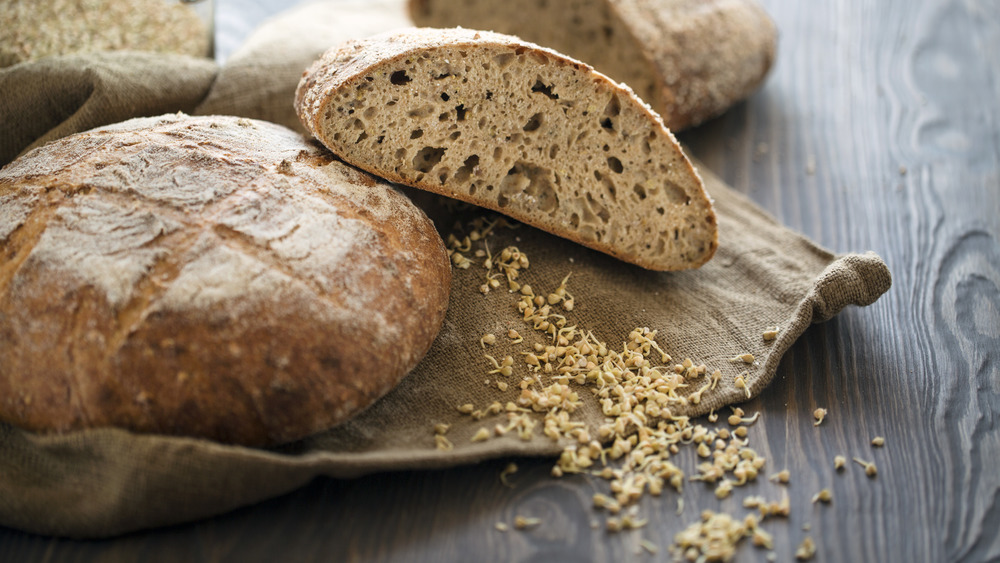The One Type Of Bread You Aren't Eating But Should
Contrary to what some carbo-phobes would have you believe, bread actually can be part of a healthy diet. Healthline advises that while bread is high in carbohydrates and some varieties can be low in micronutrients like protein, fiber, vitamins, and minerals, other types of bread are enriched with additional nutrients and can in fact be good for you. We'd love to tell you that crushing a baguette with a side of brioche each day is the key to good health, but it turns out, there may be a better-for-you option out there.
Mashed spoke with Desiree Nielsen, a registered dietician who also happens to be a partner of the Silver Hills bread bakery and the author of the plant-based cookbook "Eat More Plants". According to Nielsen, sprouted bread is the type you really should be eating. If the term "sprouted bread" conjures up images of unwelcome growths shooting out of your loaves of sourdough, don't worry – this is not that. Apparently, the sprouting happens within the grains themselves, and not only is it entirely palatable but Nielsen says it's nutritious, too. Here's what you need to know.
What is sprouted bread and why is it good for you?
Before we get into all the benefits sprouted bread may bring to the table, let's start with the basics. Nielsen explained, "Sprouted grains start with a grain kernel – the seed of a wheat plant or other grain – which is soaked in water and allowed to sprout. When the tail of the sprout has emerged from the seed and has grown no longer than the length of the grain kernel, it's considered a sprouted whole grain." Those sprouted grains are used in place of flour in the bread dough.
The sprouting process Nielsen described is where all the nutritional magic happens. She said, "Sprouting uses all the nutrients stored inside the grain and makes their benefits even more available. Vitamins, minerals, and antioxidants are released, proteins become amino acids, the fiber changes, and starches break down to make for easy absorption and digestion." She added, "Sprouting breaks down the 'antinutrients' that protect the minerals in every seed. Antinutrients aren't harmful, but they hold on tight to the grain's minerals. As sprouting breaks down these inhibitors, minerals like iron, magnesium, and zinc are unlocked." In some studies, the bioavailability of zinc was increased by as much as 234 percent. That's great news since, according to The Mayo Clinic, zinc aids in the functioning of our bodies' immune systems and metabolism – two things none of us would like to do without.
Sprouted bread may give you energy and could be good for your gut
Caffeine fiends of the world, take note – there are other ways to put a little pep in your step! Nielsen said sprouted breads can be higher in folate than traditional bread and, among other benefits, Medical News Today reports that folate helps convert carbohydrates into energy. Nielsen added, "Some studies suggest sprouted whole grains may have a lower impact of glycemic response than [an] un-sprouted whole grain, meaning they give you steady energy to fuel your day."
Not only that, but because of the way sprouting changes the fiber in the grain, sprouted bread may be easier to digest and can even serve as a prebiotic, bolstering the good bacteria in your gut. Though it wouldn't be suitable for someone with Celiac disease, sprouting does reduce the amount of gluten in the grain. So, those with gluten sensitivities may find it easier to stomach.
Lastly, let's not forget – sprouted bread has great flavor! Nielsen described it as "subtly sweet with fruity and honeyed flavors [and] a roasted, nutty taste." She noted that the natural sweetness lessens the need for added sugars and some brands, like Silver Hills, even rely on natural sweeteners like apple puree. In all, Nielsen advised, "Switching to sprouted whole grain bread is a simple yet powerful swap to add more nutrition into your daily routine." Is it really the tasty, nutritional powerhouse it's cracked up to be? You'll just have to try it for yourself and see.


